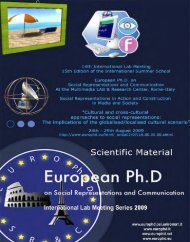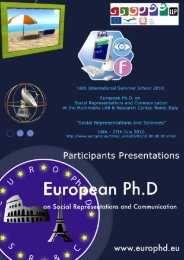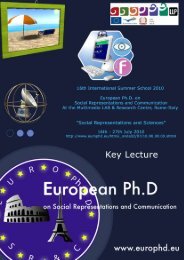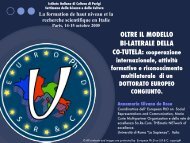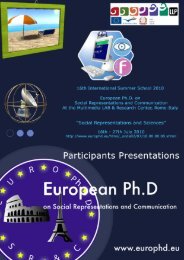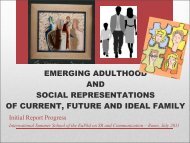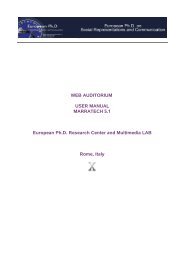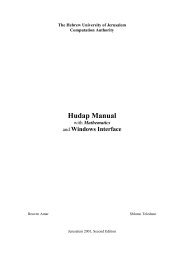The "boomerang" effect of the radicalism in discourse analysis
The "boomerang" effect of the radicalism in discourse analysis
The "boomerang" effect of the radicalism in discourse analysis
Create successful ePaper yourself
Turn your PDF publications into a flip-book with our unique Google optimized e-Paper software.
<strong>in</strong>terest <strong>in</strong> <strong>the</strong> SR <strong>the</strong>ory <strong>in</strong>s<strong>of</strong>ar as <strong>the</strong>y glimpse <strong>the</strong> potential for <strong>in</strong>tegration with various<br />
paradigms <strong>of</strong> <strong>the</strong> cognitivist mould (e.g. with cognitive schemes: see Augost<strong>in</strong>ous and<br />
Innes, 1990).<br />
<strong>The</strong> most vigorous criticisms <strong>of</strong> SR <strong>the</strong>ory have until now been made by those<br />
researchers <strong>in</strong> <strong>the</strong> Anglo-Saxon tradition who are - paradoxically - most open to adopt<strong>in</strong>g a<br />
wider social horizon, to us<strong>in</strong>g methodological approaches not limited to laboratory<br />
procedures (what Potter and Billig, 1992, call “methodological <strong>in</strong>dividualism”) and to <strong>the</strong><br />
possibility <strong>of</strong> <strong>in</strong>tegrat<strong>in</strong>g approaches used <strong>in</strong> different discipl<strong>in</strong>es - for example with<br />
ethogenics (Harré, 1984), anthropology (Jahoda, 1988) and rhetorical discoursive<br />
psychology (Potter & Litton, 1985; Potter & We<strong>the</strong>rell, 1987; Potter, 1992, 1996; Potter &<br />
Edwards, 1999). Repeatedly, <strong>the</strong>se authors confess shar<strong>in</strong>g Moscovici’s reservations about<br />
conventional social psychology, which is anchored to mechanistic and positivistic models,<br />
and <strong>the</strong>y seem to accept <strong>the</strong> challenge <strong>of</strong> develop<strong>in</strong>g an alternative European proposal to<br />
<strong>the</strong> dom<strong>in</strong>ant <strong>in</strong>dividualistic North American tradition, which has forgotten <strong>the</strong><br />
contribution <strong>of</strong> authors such as Mead and Lew<strong>in</strong>.<br />
With regard to Social Representation <strong>The</strong>ory <strong>the</strong>y recognise a number <strong>of</strong> important<br />
virtues over more traditional social psychological <strong>the</strong>ories, <strong>in</strong> particular: “a) an emphasis<br />
on <strong>the</strong> content or mean<strong>in</strong>g <strong>of</strong> human life; b) an emphasis on communication as a basis for<br />
shared social understand<strong>in</strong>gs; c) an emphasis on <strong>the</strong> constructive processes through which<br />
versions <strong>of</strong> <strong>the</strong> world are established” (Potter & We<strong>the</strong>rell, 1998, p. 139).<br />
However, criticism formulated by <strong>the</strong> Radical Discoursive Analysis (RDA) with<br />
respect to SR <strong>the</strong>ory (SRT). are substantial and not only reducible at methodological<br />
level.<br />
“With some notable exceptions (e.g. Billig, 1988n, 1993; Harré, 1984, 1998, which have entered <strong>in</strong>to a<br />
dialogue <strong>of</strong> constructive engagement from rethorical and discursive perspectives) most commentaries from<br />
outside <strong>the</strong> ma<strong>in</strong>stream have been antagonistic or even hostile to <strong>the</strong> <strong>the</strong>ory <strong>of</strong> social representations (see, for<br />
example, <strong>the</strong> catalogue <strong>of</strong> objections <strong>in</strong> <strong>the</strong> recent contribution from Potter & Edwards, 1999)”<br />
(Duveen , 2000, p. 13)<br />
<strong>The</strong> RDA-SRT dispute orig<strong>in</strong>ates from a "mentalist" read<strong>in</strong>g <strong>of</strong> <strong>the</strong> S.R. construct,<br />
assum<strong>in</strong>g <strong>the</strong> social representations as cognitive representations, a read<strong>in</strong>g, <strong>in</strong> truth,<br />
show<strong>in</strong>g little respect for <strong>the</strong> formulation that Mosovici had given to this concept <strong>in</strong><br />
qualify<strong>in</strong>g <strong>the</strong> representations as "social", not only <strong>in</strong> <strong>the</strong>ir contents, but also on account <strong>of</strong><br />
<strong>the</strong>ir genesis and <strong>the</strong> communication processes <strong>the</strong>y subtend and for <strong>the</strong> functions <strong>the</strong>y<br />
perform <strong>in</strong> <strong>the</strong> relationships between groups and <strong>in</strong>dividuals. Start<strong>in</strong>g from this s<strong>in</strong>gularly<br />
angled viewpo<strong>in</strong>t <strong>of</strong> <strong>the</strong> construction <strong>of</strong> S.R., <strong>the</strong> objective <strong>of</strong> <strong>the</strong> RDA is that <strong>of</strong><br />
substitut<strong>in</strong>g <strong>the</strong> approach still judged "too cognitivist" <strong>of</strong> <strong>the</strong> SRT by a more genu<strong>in</strong>ely<br />
anti-cognitivist approach. One <strong>of</strong> <strong>the</strong> <strong>the</strong>oretical dispute concerns <strong>the</strong> relationship between<br />
cognition and action. <strong>The</strong> SRT has ma<strong>in</strong>ta<strong>in</strong>ed that social practices reflect and create, <strong>in</strong><br />
dialogue-circular type dynamics, <strong>the</strong> SR admitt<strong>in</strong>g <strong>the</strong> existence <strong>of</strong> culturally shared codes<br />
<strong>of</strong> <strong>in</strong>terpretation and <strong>of</strong> attribution <strong>of</strong> mean<strong>in</strong>g. <strong>The</strong> RDA, characterised by a drastic "antimentalist"<br />
orientation, has, <strong>in</strong>stead, criticised this circular vision, ma<strong>in</strong>ta<strong>in</strong><strong>in</strong>g <strong>the</strong><br />
usefulness <strong>of</strong> an approach centred solely on <strong>the</strong> <strong>analysis</strong> <strong>of</strong> social practices, tout court<br />
6




